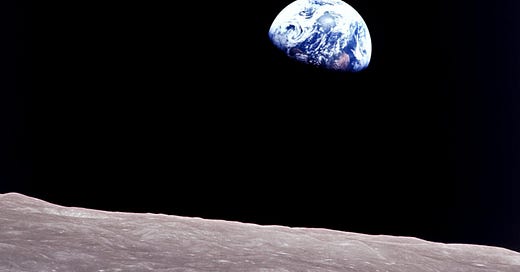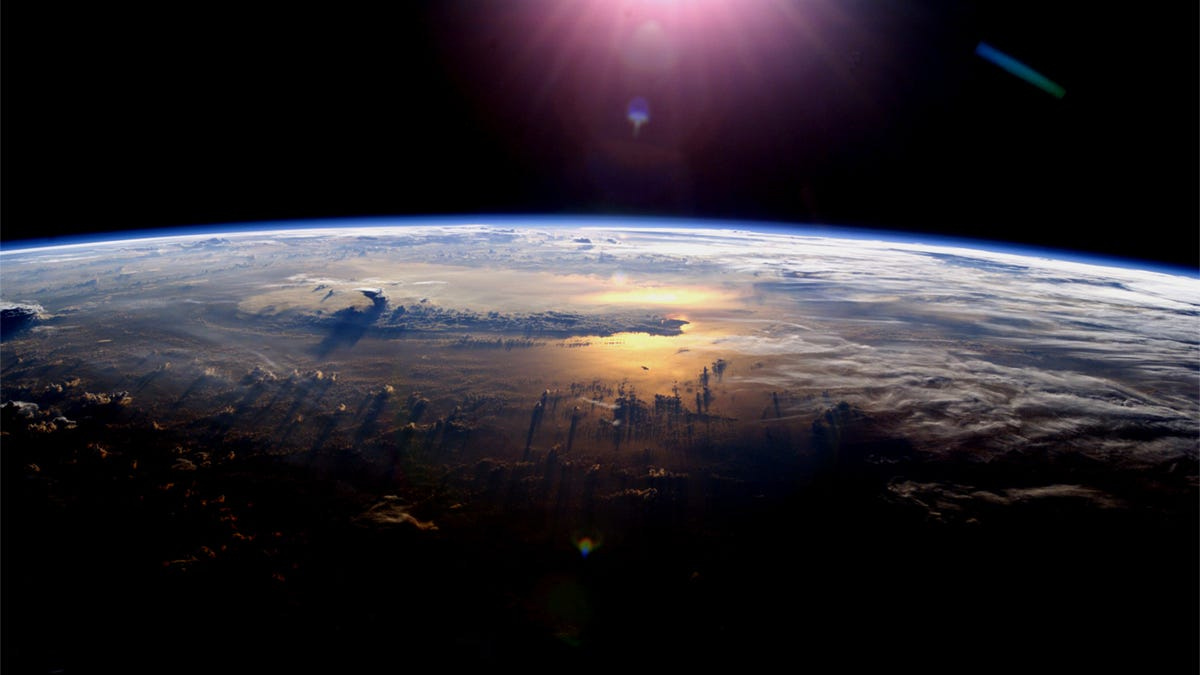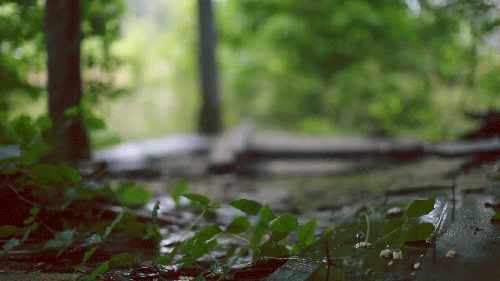The Overview Effect: How Seeing Earth from Space Changes Astronauts' Perspective
An Inspiring Story On How People See Our Planet After Their Spaceflight
Imagine that you are in a spacecraft in lunar orbit, and while being amazed by the close view of the Moon's surface, soon after, you get a glimpse of the Earth.
The planet is rising from behind the surface of the Moon and shows its bright blue beauty.
How would you react at that moment? What feelings and emotions would strike you as you see our planet Earth?
You might have the imagination to assume how you would live through that experience. However, 24 people actually had the chance to see Earth outside of low Earth orbit.
The hypothetical scenario I described above did happen, and the most significant time was in December 1968 during the Apollo 8 mission - the first crewed mission that reached lunar orbit.
On Christmas Eve, December 24, 1968, Apollo 8 was orbiting around the Moon when the Earth was rising.
This was a vastly new experience for the crew and humankind as well.
Here's the transcript from those moments:
Anders: Oh my God! Look at that picture over there! There's the Earth coming up. Wow, that's pretty.
Borman: Hey, don't take that, it's not scheduled. (joking)
Anders: (laughs) You got a color film, Jim? Hand me a roll of color, quick, would you?
Lovell: Oh man, that's great!
Anders: Hurry.
Lovell: Where is it?
Anders: Quick
YYou can also listen to their audio here; it's incredible how they captured this historical moment on tape.
Bill Anders, who photographed that famous Earthrise photo on Apollo 8, summarized the phenomenon quite well:
"We came all this way to explore the Moon, and the most important thing is that we discovered the Earth."
His crewmate, Jim Lovell, said that seeing Earth made him realize what we have back on Earth and how our planet is a "grand oasis to the big vastness of space."
Edgar Mitchell, the Lunar Module Pilot of Apollo 14, explained how he tried to find a religious, spiritual, or scientific answer to what he experienced in space as he saw Earth. Since there was none, he sought help from his local university, and they came back with an explanation.
They found a relatable definition in ancient Hindu and yogic philosophy called Savikalpa Samadhi. This explains that if you see things as you see them, emotionally and viscerally, as ecstasy and (with) a sense of total unity and oneness.
As Mitchell said, this is exactly how he felt during his lunar mission.
The Theory of Overview Effect And How It Inspired Astronauts To Take Action
Almost 20 years after the crewed lunar missions, writer Frank White interviewed 29 astronauts and studied their testimony, leading him to the creation of The Overview Effect theory.
The theory describes how astronauts - and, nowadays, civilian space travelers - experience how their sight of Earth from space transforms their perspective on life on our planet.
One of the most striking aspects of the Overview Effect is the sense of interconnectedness that it can inspire. Astronauts have described feeling a deep connection to Earth and all of its inhabitants and a renewed appreciation for the beauty and fragility of our planet.
"Looking down at our planet from the Moon, you don't see any divisions there of nations or states. This is all just one world, and it's a very small one."
Charles Duke
Astronaut Kathryn Sullivan, who spent 22 days in space during 3 Space Shuttle missions, has described her experience of seeing the Earth from space as a "wake-up call" that motivated her to become more involved in environmental issues.
She has since become an advocate for ocean conservation and a board member of the Ocean Exploration Trust.
Ron Garan, who flew on both the Space Shuttle and the Soyuz spacecraft, has also been inspired by the Overview Effect to take action on environmental issues.
After his missions to the International Space Station, Garan founded the Fragile Oasis organization to promote sustainability and conservation on Earth.
How A Suborbital Spaceflight Gave The Deepest Grief To William Shatner
Not all space travelers experienced the Overview Effect in a positive and elevated aspect.
At the age of 90, the Star Trek actor had a life-changing experience as he took part in Blue Origin's suborbital mission.
In his memoir, he explained how he saw death as he looked at the deep darkness of space. However, in a recent editorial in The Guardian, he further expounded on his experience.
“While I was looking away from Earth, and turned towards the rest of the universe, I didn't feel connection; I didn't feel attraction. What I understood, in the clearest possible way, was that we were living on a tiny oasis of life, surrounded by an immensity of death.
I didn't see infinite possibilities of worlds to explore, of adventures to have, or living creatures to connect with. I saw the deepest darkness I could have ever imagined, contrasting starkly with the welcoming warmth of our nurturing home planet.”
He wrote that he realized how humankind spent decades and centuries with the obsession of looking away to space, and he also played a part in popularizing how space was the final frontier. However, he explains how we are relentlessly rushing towards making Earth uninhabitable.
What was his most extraordinary experience of traveling to space filled him with sadness and made him worry about his grandchildren and future generations.
As we live in our everyday environment as a tiny bubble, it is hard to realize what our planet means to us and what it gives to human beings.
I greatly advocate for space exploration to understand where we come from and what is out there in the great universe. It is a notion that humans can hardly comprehend. However, as technology and science evolve, we learn more about that, piece by piece.
But it is also essential to utilize space exploration's outstanding achievements to protect Earth's great treasure. Because - at least for now - there is no other place in our universe where we can go.
However, on a positive note, this is exactly what we are doing. Without the significant innovations that space exploration brought us in the past half a century, our life, especially science on Earth, would be less developed.
Medicine, agriculture, marine biology, and other disciplines are greatly advantaged by the technology we use in space exploration.
It is now our role, as individuals and collectives, to ensure that we can be on the right track to preserve what we have here on this colossal spacecraft that we call Earth.
This was the second issue of Orbital Stories. I hope you enjoyed this fascinating story on how the Earth’s view from space inspired astronauts.
Please subscribe below to receive every new issue in your inbox directly and if you like my work, please also share with others interested in human spaceflight.
How do you think that such a view of our planet would effect your perspective? Let’s chat about this on Substack Chat.
Splashdown, Orbital Stories is out.







Good read. I was surprised by Shatner’s assessment of space. It seemed sad but the darkness is lonely if you have no way to surpass it.
There’s a song called “Moonloop” by Porcupine Tree that has the moon landing audio in it. That was the first space audio I’d heard and this is the second. 🙂